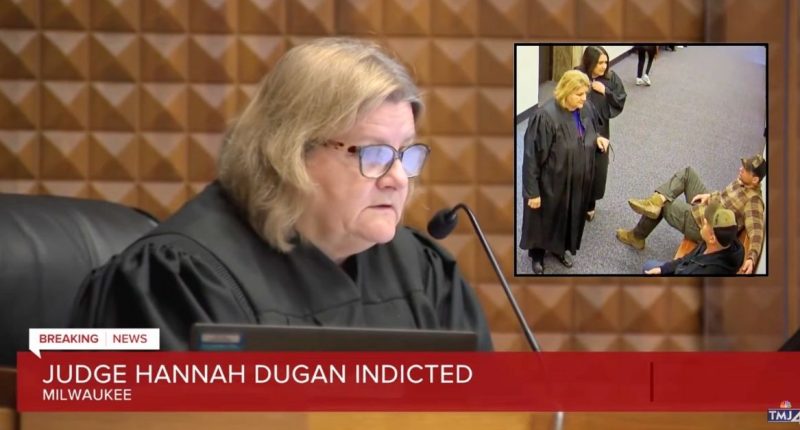Share this @internewscast.com
Background: Milwaukee County Judge Hannah Dugan in court (WTMJ/YouTube). Inset: Surveillance video shows Milwaukee County Judge Hannah Dugan speaking with ICE agents before Eduardo Flores-Ruiz’s detainment (WDJT/YouTube).
Milwaukee County Judge Hannah Dugan cannot avoid criminal charges for allegedly interfering with ICE agents, according to a decision by a federal judge in Wisconsin on Tuesday. Dugan was indicted on federal charges for allegedly hindering agents during an immigration operation and must face prosecution “simply because she encountered federal agents while on duty at the courthouse,” as stated in the ruling, and must now proceed to trial.
“There is no foundation for granting immunity simply because some allegations in the indictment detail conduct potentially considered ‘part of a judge’s job,'” wrote U.S. District Judge Lynn Adelman in his 27-page ruling, released Tuesday in the Eastern District of Wisconsin. “In other words, they are all ‘official acts,'” Adelman noted.
Adelman, appointed by Bill Clinton, pointed out that Dugan claimed judicial immunity transcends the civil domain and “guards against criminal responsibility for most official acts.” However, the Justice Department argues that even if a doctrine of immunity for judicial acts was in place, the evidence indicates that Dugan “acted well beyond her judicial capacity.”
According to Adelman, the incidents in Dugan’s case “originated from her independent, nonjudicial, and unofficial actions outside the scope of a Wisconsin state judge by obstructing a federal immigration case over which she had no jurisdiction.”
“Even though the magistrate judge recognized that some allegations described conduct that could be deemed part of a judge’s duties, she clarified that the defendant wasn’t being prosecuted for on-the-spot decisions, courtroom management, or permitting someone to appear via Zoom,” Adelman explained. “Instead, the indictment pinpointed specific breaches of federal criminal laws.”
Dugan, 66, is accused of helping an undocumented immigrant evade federal officers shortly after he appeared in her Milwaukee County Circuit courtroom on domestic abuse charges. She filed a motion in May seeking to have the federal obstruction charges dismissed, arguing that — like presidential immunity for official acts — she benefits from broad judicial immunity.
Since then, prosecutors and defense attorneys filed competing arguments on whether the case should proceed. Dugan’s 30-page filing on July 15 alleged she was being prosecuted “for doing her job, not in the way that some federal agents preferred, true, but her job all the same.” The Justice Department responded with a filing of its own, which rebuked Dugan’s claims and mocked her for explaining them in a “gerrymandered way,” per the DOJ.
“Dugan’s assumption of immunity wrongly inverts the analysis on a motion to dismiss charges that are properly pled in an indictment,” federal prosecutors said. “Even in her view, criminal prosecutions of state judges are undisputedly permitted in certain circumstances. However, this does not in any way imply the creation of categories where prosecutions are forbidden in other circumstances.”
Adelman said in his Tuesday ruling that the dispute ultimately “boils down” to one thing.
“[Dugan] posits a general rule of immunity, subject to certain exceptions which account for the previous (and legitimate) prosecutions of judges,” Adelman said. “According to the government, there is no general rule of immunity, and what defendant calls exceptions are simply examples of the types of prosecutions that have been brought against judges. A review of the relevant history reveals the government has the better of the argument.”
Dugan’s lawyers have condemned her prosecution as “far-fetched,” while the DOJ insists she is using “amorphous and contestable distinctions” to prop up her arguments.
In the July 15 filing, Dugan’s attorneys claimed that if the case proceeded, state and federal judges would be “vulnerable” to prosecution by the federal executive “any time they handle a trial involving contraband in evidence or schedule a hearing in ways that inconvenience — and thus arguably impede — federal officers.”
That same month, U.S. Magistrate Judge Nancy Joseph issued a recommendation to Adelman. Joseph stated that while judges are largely immune in civil cases for official actions, no such judicial immunity exists in criminal prosecutions. Prosecutors said they believed Joseph’s recommendation was correct and that Dugan’s objection would not provide a “sound reason” to dismiss her indictment.
“Accepting her claim about the nature of her prosecution would require fact-finding, which is untenable on a motion to dismiss, a principle that the magistrate judge followed and to which Dugan has not objected,” the DOJ said.
Dugan’s lawyers did not respond to Law&Crime’s requests for comment Tuesday.














